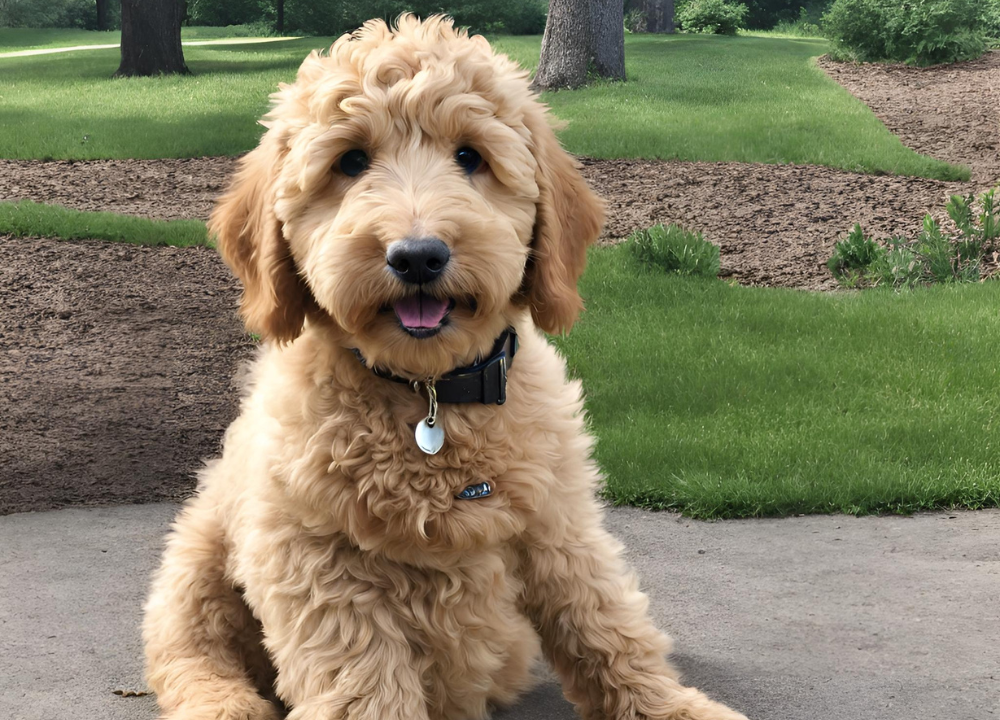The Mini Goldendoodle reaches its full grown size in around 12-15 months. Mini Goldendoodles are a popular small to medium-sized dog breed that is a cross between a Golden Retriever and a Miniature Poodle.
They are known for their friendly and affectionate nature, making them great family pets. As they grow older, Mini Goldendoodles usually reach their full grown size in about 12-15 months. Their adult weight can vary but is typically between 15-35 pounds.
These dogs have a wavy or curly coat that requires regular grooming to prevent matting and tangling. They are highly intelligent and trainable, making them suitable for various activities such as therapy work, agility training, and obedience competitions. Additionally, Mini Goldendoodles are generally healthy dogs, but like all breeds, they can be prone to certain health issues such as hip dysplasia and allergies. Regular exercise, a balanced diet, and regular veterinary check-ups are essential to ensure their overall well-being.
Mini Goldendoodle: An Overview
The Mini Goldendoodle is a popular crossbreed dog that is a mix between a Golden Retriever and a Miniature Poodle. Known for their adorable appearance and friendly personality, Mini Goldendoodles have become a favorite choice for families and individuals alike. In this article, we will explore some key aspects of the Mini Goldendoodle, including their appearance and size, temperament and personality, as well as their care and grooming requirements.
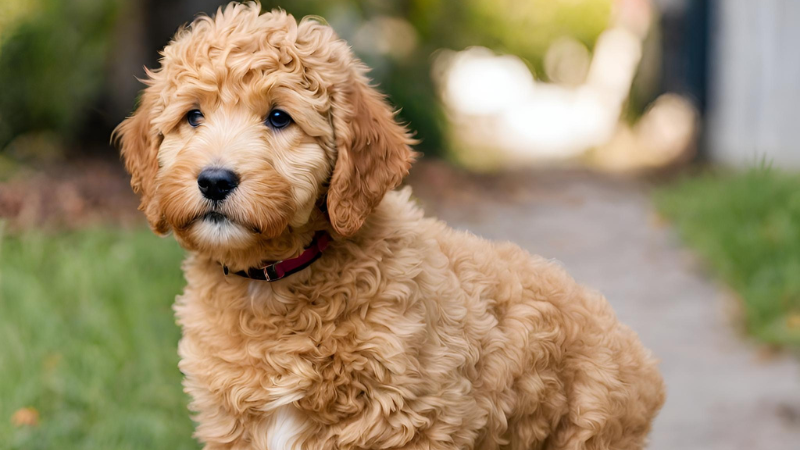
Appearance And Size
The Mini Goldendoodle inherits features from both its parent breeds, resulting in a charming and unique appearance. These dogs have a fluffy, non-shedding coat that can vary in color, including shades of gold, cream, apricot, or red. Their coats can also be straight, wavy, or curly, depending on the genetic traits they inherit.
In terms of size, Mini Goldendoodles are typically smaller than standard Goldendoodles. They are bred to be miniature versions of the popular Goldendoodle, standing around 14 to 17 inches tall at the shoulder. Their weight can vary between 15 and 35 pounds, depending on the size of the Miniature Poodle parent and the genetics involved. Due to their compact size, Mini Goldendoodles are well-suited for both small apartments and larger homes with yards.
Temperament And Personality
The Mini Goldendoodle is renowned for its friendly and outgoing personality, making it an excellent companion for individuals and families of all ages. They are known to be social, loving, and gentle, which makes them an ideal choice for households with children or other pets. Mini Goldendoodles are often described as highly intelligent and eager to please, which makes training them relatively easy compared to other breeds.
This breed is known for being affectionate and loyal, forming strong bonds with their owners. They thrive on human companionship and can adapt well to different lifestyles, whether you lead an active or more laid-back lifestyle. Despite their friendly nature, Mini Goldendoodles can also possess a playful and energetic side, especially during their puppy days. Regular exercise and mental stimulation are essential to keep them happy and content.
Care And Grooming
When it comes to caring for a Mini Goldendoodle, proper grooming is necessary to keep their coat healthy and matt-free. The non-shedding nature of their hair means that they require regular brushing to prevent tangles and matting. Additionally, professional grooming every 6 to 8 weeks is recommended to maintain their coat’s appearance and health.
To keep your Mini Goldendoodle’s energy levels in check, daily exercise is crucial. This can involve brisk walks, playtime in a fenced yard, or interactive games that stimulate their minds. Adequate exercise helps prevent boredom and destructive behavior often associated with under-stimulated dogs.
In terms of health, the Mini Goldendoodle is generally considered to be a relatively healthy breed. However, like any other dog, they may be prone to certain conditions such as hip dysplasia, ear infections, or allergies. Regular veterinary check-ups, a balanced diet, and proper hygiene can help minimize the risk of such health issues.
In conclusion, the Mini Goldendoodle is a delightful and affectionate crossbreed that brings joy and companionship to any home. Their charming appearance, friendly temperament, and low-shedding coat make them a favored choice among dog lovers. By providing them with proper care, attention, and affection, you can enjoy a rewarding and fulfilling relationship with these lovable companions.
Mini Goldendoodle Full Grown Stages
As a proud Mini Goldendoodle owner, you’re probably excited to see your fur baby grow and develop. Understanding their growth stages can help you provide the best care and training for your Mini Goldendoodle. In this article, we’ll explore the three significant growth stages of Mini Goldendoodles: Puppyhood, Adolescence, and Adulthood.
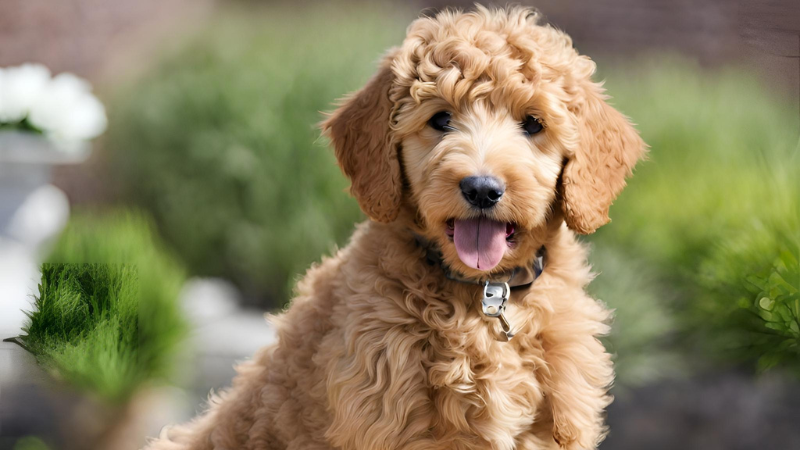
Puppyhood
Puppyhood is an adorable and crucial stage in your Mini Goldendoodle’s life. During this time, your pup will undergo significant physical and mental development. Here’s a breakdown of what to expect:
- Size: Mini Goldendoodles typically weigh between 15 to 30 pounds during puppyhood.
- Dental Development: Your pup will start teething around three to four months of age. Provide appropriate chew toys to help soothe their gums and prevent destructive chewing.
- Training: Start basic obedience training early on, focusing on commands like sit, stay, and recall. Consistency and positive reinforcement are key.
- Socialization: Introduce your Mini Goldendoodle to various people, animals, and environments to ensure they grow into well-rounded and sociable adults.
Remember, patience and consistency are essential during the puppyhood stage. Provide plenty of love, attention, and proper nutrition to support their growth and development.
Adolescence
Just like human teenagers, Mini Goldendoodles go through adolescence, which can be a challenging but rewarding stage. Here’s what you need to know:
- Physical Changes: Your Mini Goldendoodle will go through a growth spurt, both in terms of height and weight. Expect them to gain muscle and fill out their frame.
- Energetic Nature: Due to their increased energy levels, daily exercise and mental stimulation are crucial during this stage. Engage in activities such as walks, playdates, and puzzle toys.
- Continued Training: Adolescence is a critical time for reinforcing previous training and introducing advanced commands. Stay consistent with positive reinforcement techniques to help them become well-behaved adults.
- Socialization: Continue to expose your Mini Goldendoodle to new experiences and environments. This helps prevent anxiety and fear-based behaviors in adulthood.
While adolescence can be challenging, with consistent training and love, your Mini Goldendoodle will mature into a well-behaved and happy adult.
Adulthood
Finally, your Mini Goldendoodle reaches adulthood, where they settle into their fully grown size and personality. Here’s what you can anticipate during this stage:
- Full Size: Mini Goldendoodles generally reach their full adult size between 10 to 12 months, with weight ranging from 15 to 30 pounds.
- Temperament: By now, your Mini Goldendoodle’s temperament is more predictable. They may exhibit traits from both the Golden Retriever and Poodle parents, such as intelligence, friendliness, and loyalty.
- Maintenance: Regular grooming, including brushing their coat and trimming their nails, is essential to keep your Mini Goldendoodle looking and feeling their best.
- Healthcare: Adult Mini Goldendoodles require regular check-ups, vaccinations, and preventive care to ensure they live a healthy and happy life. Consult your veterinarian for specific healthcare recommendations.
Congratulations on your Mini Goldendoodle reaching adulthood! Enjoy the years of love and companionship ahead with your furry family member.
Mini Goldendoodle Full Grown Size
When it comes to the size of a Mini Goldendoodle Full Grown, there are several factors that can influence it. Understanding these factors and the potential size range of Mini Goldendoodles can help potential owners make an informed decision.
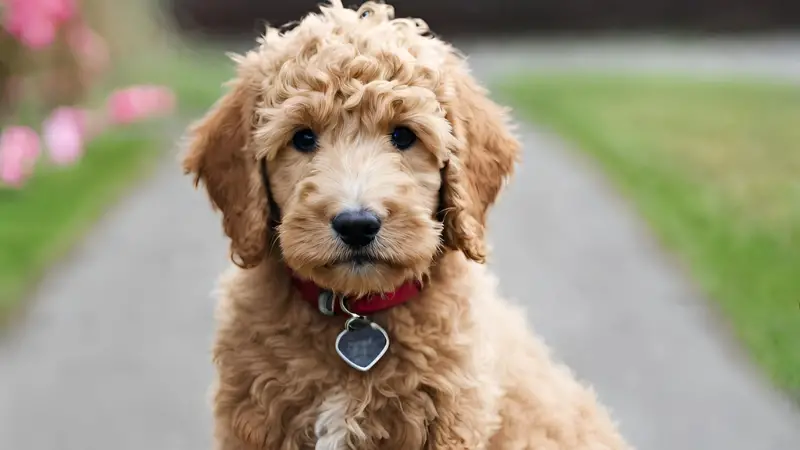
Factors Affecting Size
There are a few key factors that affect the size of a Mini Goldendoodle Full Grown:
- Genetics: Like any other dog breed, genetics play a significant role in determining the size of a Mini Goldendoodle. The traits inherited from the parent breeds, the Golden Retriever and the Miniature Poodle, can contribute to variations in size.
- Parental Size: The size of the Mini Goldendoodle’s parents also plays a crucial role. If both parents are on the smaller end of the size spectrum, it is more likely that the offspring will be smaller as well.
- Diet and Exercise: Proper nutrition and exercise throughout the dog’s life can also influence its size. A well-balanced diet and regular exercise help maintain a healthy weight and body structure.
Size Range
The Mini Goldendoodle Full Grown can fall into a size range that makes it suitable for various living situations. While exact measurements can vary, typically, a full grown Mini Goldendoodle can stand between 14 to 20 inches tall at the shoulder and weigh between 15 to 35 pounds.
The Mini Goldendoodle size full grown makes it a popular choice for individuals and families alike. Its compact size and adorable appearance make it ideal for apartment living or homes with limited space.
Variations In Size
It is important to note that there can be variations in size even within the same litter of Mini Goldendoodles. This is because each puppy inherits a unique combination of genes from its parents, resulting in differences in size.
Some puppies may mature to be on the smaller side of the size range, referred to as a full grown micro mini Goldendoodle, while others may be at the larger end. However, breeders can often provide an estimate of a puppy’s expected size based on the size of its parents.
Regardless of the specific size, Mini Goldendoodle Full Grown are known for their lovable and friendly nature, making them a beloved choice for many families.
Mini Goldendoodle Full Grown Physical Development
When it comes to the physical development of Mini Goldendoodle Full Grown, it is important to understand the different stages they go through as they grow. From birth to full growth, these adorable furry companions undergo significant changes in their size, appearance, and overall development. In this blog post, we will explore the three main stages of a Mini Goldendoodle’s physical development – Birth to 6 Months, 6 Months to 12 Months, and 1 Year to Full Growth.
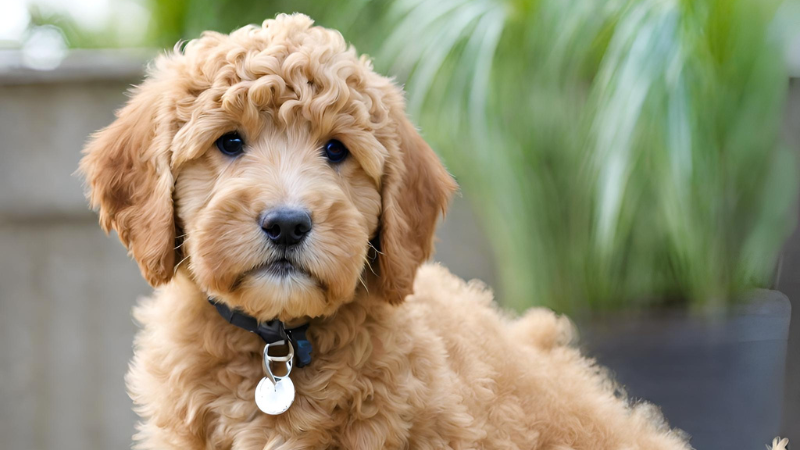
Birth To 6 Months
During the first six months of a Mini Goldendoodle’s life, they experience remarkable growth and development. At birth, these little bundles of joy typically weigh between 7 to 14 ounces and measure around 4 to 7 inches in length. As they enter their first few weeks, the Mini Goldendoodle puppies begin to experience rapid growth and gain weight at an impressive rate.
Within the span of just a couple of months, the Mini Goldendoodle puppies double, triple, or even quadruple their birth weight. Their bones start to strengthen, and they become more steady on their feet. By the age of 8 weeks, they usually reach around 5 to 10 pounds and stand about 8 to 10 inches tall at the shoulder.
From 3 to 6 months old, Mini Goldendoodles continue to grow steadily in both height and weight. Depending on various factors such as genetics and diet, their weight can range anywhere between 10 to 30 pounds, with a height between 10 to 15 inches at the withers. This period is crucial for their physical development, as it sets the foundation for their adult size and overall appearance.
6 Months To 12 Months
Between 6 months to 12 months of age, Mini Goldendoodles continue to mature physically. Their growth rate slows down compared to the previous stage, but they still undergo significant changes. During this period, their skeletal structure starts to fill out, and they begin to look more like miniature versions of the adult Goldendoodles.
Average Mini Goldendoodles within this stage usually weigh between 25 to 45 pounds and stand around 13 to 20 inches in height. Their coat becomes denser and more wavy or curly, showcasing the signature Goldendoodle look. It is essential to provide them with a balanced diet, regular exercise, and proper grooming during this stage to ensure their healthy growth and development.
1 Year To Full Growth
Once a Mini Goldendoodle reaches their first year, they are considered fully grown or close to their adult size. However, it is important to note that some slight growth and development may continue until they reach the age of 1.5 to 2 years, depending on individual genetics.
| Weight Range | Height Range |
|---|---|
| 25 to 45 pounds | 13 to 20 inches |
| Weight Range | Height Range |
| 25 to 45 pounds | 13 to 20 inches |
These gentle and intelligent companions display their characteristic traits, such as their friendly and social nature. Their bodies have fully matured, and their physical appearance now resembles that of an adult Goldendoodle. Proper nutrition, exercise, and regular veterinary check-ups are vital during this stage to maintain their overall well-being and ensure they live a long, healthy life.
Mini Goldendoodle Full Grown Exercise Needs
The Mini Goldendoodle is a small but energetic breed that requires regular exercise to stay happy and healthy. Daily exercise is essential for this breed to prevent weight gain, promote muscle development, and stimulate mental well-being. In this section, we will explore the exercise needs of Mini Goldendoodles, including their daily exercise requirements, engaging activities, and the importance of mental stimulation.
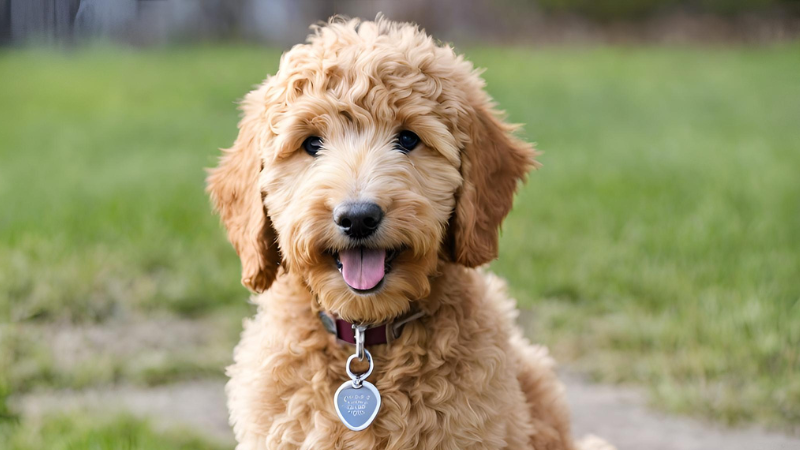
Daily Exercise Requirements
Mini Goldendoodles have moderate exercise needs that can be met with around 30 to 45 minutes of physical activity per day. This breed loves playtime and enjoys activities that allow them to run, jump, and explore their surroundings. Daily exercise not only helps to keep Mini Goldendoodles physically fit, but it also provides an outlet for their high energy levels.
To meet their exercise requirements, you can engage in various activities that cater to their nature as a playful and active breed. The exercise routine should include a combination of cardiovascular activities, strength-building exercises, and mental stimulation.
Engaging Activities
There are several engaging activities that you can incorporate into your Mini Goldendoodle’s exercise routine. These activities not only keep them physically active but also provide mental stimulation and promote a bond with their humans. Some engaging activities for Mini Goldendoodles include:
- Fetching: Throwing a ball or a toy for your Mini Goldendoodle to retrieve can provide an excellent cardiovascular workout for them. It is an engaging game that they usually love.
- Long Walks: Taking your Mini Goldendoodle for a brisk walk not only helps them burn off energy but also allows them to explore different scents and environments.
- Swimming: Mini Goldendoodles are often natural swimmers, thanks to their Golden Retriever heritage. Swimming can be a low-impact, full-body exercise that is easy on their joints and muscles.
- Agility Training: Setting up an agility course in your backyard or participating in organized agility classes can challenge your Mini Goldendoodle’s mind and body. It helps them develop coordination and problem-solving skills.
Mental Stimulation
In addition to physical exercise, mental stimulation is crucial for Mini Goldendoodles. These intelligent dogs thrive when they are mentally engaged and challenged. Mental stimulation can prevent boredom, which can lead to destructive behaviors such as chewing or excessive barking.
You can provide mental stimulation to your Mini Goldendoodle through various activities, such as:
- Puzzle Toys: Using puzzle toys or treat-dispensing toys can keep your Mini Goldendoodle occupied while stimulating their problem-solving skills.
- Obedience Training: Mini Goldendoodles are highly trainable. Incorporating regular obedience training sessions into their routine can provide mental stimulation and reinforce positive behaviors.
- Scent Games: Hiding treats or toys around the house and encouraging your Mini Goldendoodle to find them using their sense of smell is an excellent way to engage their mind.
Remember, each Mini Goldendoodle is unique, and their exercise needs may vary. It is always important to consult with your veterinarian to determine the most suitable exercise routine for your furry friend.
Training A Mini Goldendoodle Full Grown
Training a Mini Goldendoodle Full Grown can be a rewarding experience for both you and your furry companion. These intelligent and energetic dogs thrive on mental stimulation and love to please their owners. Whether you’re teaching them basic commands or advancing their training, consistency, patience, and positive reinforcement are key. In this blog post, we will explore how to effectively train your Mini Goldendoodle Full Grown to ensure they are well-behaved and happy.
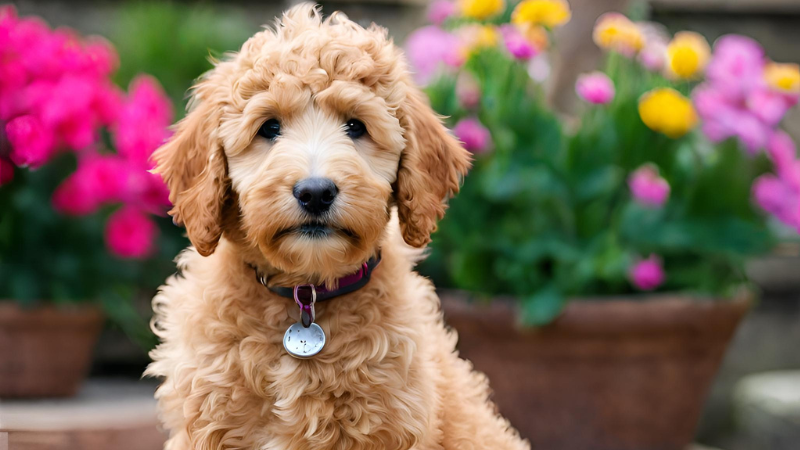
Basic Commands
In order to establish a strong foundation for obedience and communication, teaching your full grown mini Goldendoodle basic commands is essential. These commands will not only make your daily interactions easier but also help keep your dog safe in different situations. Here are a few basic commands you can start with:
- Sit: Teach your Goldendoodle to sit on command by holding a treat above their head and slowly moving it towards their back. As they follow the treat, their natural instinct to sit will kick in. Reward them with the treat and praise when they successfully sit.
- Stay: Training your Goldendoodle to stay in one place is crucial for their safety. Begin by commanding them to sit or lie down, then step a few feet away. Extend the duration gradually, rewarding them each time they remain in place. Practice this command in various locations, gradually increasing distractions.
- Come: Teaching your Goldendoodle to come when called is essential for their safety and your peace of mind. Start in a quiet, enclosed area and call their name followed by the command “come.” When they approach you, reward them with treats and praise. Gradually increase the distance and distractions.
Advanced Training
Once your Mini Goldendoodle Full Grown has mastered the basic commands, you can move on to more advanced training. This not only keeps their minds engaged but also strengthens the bond between you and your furry friend. Here are a few advanced training techniques to consider:
- Heel: Train your Goldendoodle to walk beside you without pulling on the leash. Begin by reinforcing loose leash walking, rewarding them when they stay close to your side. Gradually introduce the command “heel” and reward them when they successfully walk beside you.
- Fetch: Teaching your Goldendoodle to fetch is a fun and interactive game that strengthens their retrieving skills. Start by throwing a toy a short distance and use the command “fetch.” Encourage them to retrieve the toy and bring it back to you. Reward them with praise and treats for successfully completing the task.
- Tricks: Goldendoodles are quick learners, making them perfect candidates for learning tricks. Teach them tricks such as rollover, shake hands, or play dead using positive reinforcement and rewards. Break down each trick into easy-to-follow steps and gradually increase the difficulty level as your Goldendoodle progresses.
Socialization
Socialization plays a crucial role in ensuring your Mini Goldendoodle Full Grown is well-rounded and comfortable around other people, animals, and various environments. Exposing them to different situations from an early age can help prevent behavioral issues in the future. Here are some tips for socializing your Goldendoodle:
- Start early: Introduce your Goldendoodle to new people, animals, and environments as early as possible. Expose them to different smells, sights, and sounds regularly to build their confidence and adaptability.
- Positive experiences: Ensure that every socialization experience is positive for your Goldendoodle. Reward them with treats, praise, and playtime whenever they react positively to new situations.
- Gradual exposure: Gradually expose your Goldendoodle to new and challenging situations. Start with less overwhelming environments and gradually increase the level of difficulty. This allows them to build confidence and trust in you.
Remember, training a Mini Goldendoodle Full Grown takes time, effort, and consistency. Keep the training sessions short and fun, and always end on a positive note. Celebrate their progress and be patient with any setbacks. With the right training techniques and lots of love, your Mini Goldendoodle Full Grown will become a well-behaved and happy companion.
Feeding And Nutritional Needs Full-grown Mini Goldendoodle And Puppy
Feeding and nutrition are crucial aspects of raising a Mini Goldendoodle Full Grown and ensuring their health and well-being. Whether you have a playful and energetic puppy or a mature adult companion, providing them with the right food and meeting their specific dietary needs is essential. In this section, we will discuss the guidelines for feeding your Mini Goldendoodle puppy, the diet requirements for adult dogs, and how to choose the right food that will keep them healthy and happy.
Puppy Feeding Guidelines
During their early months, Mini Goldendoodle puppies experience rapid growth and development. As a responsible pet owner, it’s crucial to feed them a balanced diet that supports their growth and provides them with the necessary nutrients. Here are some guidelines to follow when feeding your Mini Goldendoodle puppy:
- Choose a high-quality puppy food that is specifically formulated for small to medium-sized breeds. Look for ingredients like chicken, beef, or fish listed as the main protein sources.
- Feed your puppy three to four small meals throughout the day to support their growing metabolism.
- Measure the portions according to the feeding recommendations on the food packaging and adjust accordingly based on your puppy’s age, size, and activity level.
- Keep fresh water available at all times to prevent dehydration.
- Monitor your puppy’s weight and body condition to ensure they are growing at a steady and healthy rate. Consult with your veterinarian if you notice any significant weight gain or loss.
- Avoid feeding your puppy human food or treats that are not specifically made for dogs, as they may not provide the necessary nutrients or could potentially harm their digestive system.
Adult Diet Requirements
As your Mini Goldendoodle reaches adulthood, their nutritional needs change. It’s important to transition to an appropriate adult diet to meet their specific requirements. Here are some key points to consider when planning your adult Mini Goldendoodle’s diet:
- Choose a dog food that is labeled for adult dogs or all life stages to ensure it contains the necessary nutrients.
- The main protein source should still be high-quality animal protein such as chicken, lamb, or fish.
- Consider the size and activity level of your adult Mini Goldendoodle when determining portion sizes. Active dogs may require more food, while less active dogs may need smaller portions to maintain a healthy weight.
- Paying attention to your dog’s overall body condition can help you determine if they are getting the right amount of food. Adjust portion sizes accordingly to avoid excessive weight gain or loss.
- Continue to provide fresh water at all times.
Choosing The Right Food
When it comes to selecting the best food for your Mini Goldendoodle, there are a few factors to consider:
- Look for a dog food that lists real, recognizable ingredients as the main components, rather than fillers or by-products.
- Check the guaranteed analysis on the packaging to ensure the food meets the Association of American Feed Control Officials (AAFCO) standards for complete and balanced nutrition.
- Consider any specific dietary needs or sensitivities your dog may have, such as grain allergies or digestive issues. There are specialized dog foods available for these conditions.
- Consult with your veterinarian for personalized recommendations based on your Mini Goldendoodle’s individual needs and health requirements.
Feeding your Mini Goldendoodle a nutritionally balanced diet is essential for their overall health and well-being. By following the feeding guidelines for puppies and understanding the adult diet requirements, you can ensure that your furry friend receives the necessary nutrients to thrive. Choosing the right food that meets their specific needs is a crucial step in providing them with a long and healthy life.
Health Concerns And Regular Vet Check-ups
A Mini Goldendoodle Full Grown is an adorable and friendly companion, but like any other dog, they can face certain health concerns. To ensure their well-being and longevity, it’s crucial to prioritize regular vet check-ups and follow a comprehensive vaccination schedule. By addressing common health issues and maintaining good dental care, you can help your Mini Goldendoodle live a happy and healthy life.
Common Health Issues
Despite their overall robust health, Mini Goldendoodles can be prone to some common health issues. It’s essential to be aware of these concerns and take preventive measures to keep your furry friend in optimal condition. Some of the most commonly encountered health issues in Mini Goldendoodles include:
- Hip dysplasia, which can cause discomfort and mobility issues.
- Allergies, ranging from food allergies to environmental sensitivities.
- Eye disorders, such as cataracts or progressive retinal atrophy (PRA).
- Ear infections, particularly in dogs with floppy ears.
- Obesity, as Mini Goldendoodles have a tendency to gain weight if not properly managed.
By staying vigilant and addressing these health concerns early on, you can provide your Mini Goldendoodle with the best possible care.
Vaccination Schedule
Vaccinations play a crucial role in protecting your Mini Goldendoodle from various diseases and infections. Following a proper vaccination schedule ensures your dog’s immune system is fortified against potential threats. Here is a general guideline for the recommended vaccinations for Mini Goldendoodles:
| Vaccination | Age |
|---|---|
| Rabies | 12-16 weeks |
| Distemper, Hepatitis, Parvo, Parainfluenza (DHPP) | 6-8, 10-12, and 14-16 weeks |
| Leptospirosis | 12-16 weeks |
| Bordetella (Kennel Cough) | 14-16 weeks (or as recommended by the veterinarian) |
| Influenza (Canine Flu) | 14-16 weeks (optional) |
It’s important to consult with your veterinarian to create a customized vaccination plan suited to your Mini Goldendoodle’s specific needs.
Dental Care
Dental hygiene is often overlooked but crucial for the overall well-being of your Mini Goldendoodle. Just like humans, dogs can develop dental problems such as tartar buildup, gum disease, and tooth decay. Regular dental care can help prevent these issues. Here are some tips to maintain your Mini Goldendoodle’s dental health:
- Brush your dog’s teeth at least two to three times a week using dog-friendly toothpaste.
- Provide chew toys and dental treats that promote healthy teeth and gums.
- Schedule professional dental cleanings with your veterinarian as recommended.
By prioritizing oral hygiene, you can ensure your Mini Goldendoodle maintains strong teeth and fresh breath.
Maintaining A Healthy Coat Full-grown Mini Goldendoodle
Maintain a healthy coat for your Mini Goldendoodle Full Grown with proper grooming, regular brushing, and balanced nutrition.
Maintaining a Healthy Coat Mini Goldendoodle Full Grown As a proud owner of a full-grown Mini Goldendoodle, you understand the importance of keeping their coat in top-notch condition. A healthy coat not only enhances their adorable appearance but also plays a crucial role in their overall well-being. Whether your Mini Goldendoodle has a curly or wavy coat, regular maintenance is key to ensuring it stays luscious and tangle-free. In this article, we will explore essential tips to help you maintain a healthy coat for your Mini Goldendoodle Full Grown.
Brushing And Grooming Tips
To keep your Mini Goldendoodle’s coat looking its best, a proper brushing routine is essential. Regular brushing helps remove loose fur, prevents matting, and distributes natural oils for a shiny and healthy coat. Consider the following tips for efficient brushing and grooming:
- Use a slicker brush or a pin brush with rounded tips to gently remove tangles and mats.
- Start by brushing in the opposite direction of hair growth and gradually switch to brushing in the natural direction.
- Pay extra attention to the areas prone to matting, such as behind the ears, under the legs, and around the tail.
- Make brushing sessions positive and rewarding, using treats and praise to create a pleasant experience for your Mini Goldendoodle.
- Regularly check their ears, eyes, and paws for any signs of redness or irritation, and gently clean these areas as needed.
Bathing Frequency
Determining the ideal bathing frequency for your Mini Goldendoodle is essential to maintain a healthy coat without drying out their skin. While every dog is different, a general guideline for bathing full-grown Mini Goldendoodles is once every 6 to 8 weeks. However, factors such as their activity level, coat condition, and environment may influence the frequency. Keep the following points in mind when it comes to bathing your Mini Goldendoodle Full Grown:
- Use a gentle, dog-specific shampoo that is free from harsh chemicals and artificial fragrances.
- Ensure the water is lukewarm to avoid discomfort or dryness.
- Thoroughly rinse their coat to remove all shampoo residue.
- Consider using a conditioner designed for dogs with curly or wavy coats to enhance their fur texture and maintain moisture.
- Dry your Mini Goldendoodle using a clean towel and, if necessary, a low-heat blow dryer on the coolest setting to prevent their skin from drying out.
Dealing With Shedding
While Mini Goldendoodles are known for being hypoallergenic, they do shed to some extent. Understanding how to manage shedding is essential for maintaining a healthy coat and a tidy living environment. Here are some tips to help you deal with shedding:
- Regular brushing helps minimize shedding by removing loose fur before it ends up on your furniture and clothes.
- Avoid shaving or trimming your Mini Goldendoodle’s coat too short, as this can disrupt the natural shedding cycle.
- Provide a well-balanced diet rich in omega-3 fatty acids, which promotes healthy skin and coat.
- Consider using a de-shedding tool, such as a slicker brush or a grooming glove, to remove excess fur.
- If shedding becomes excessive or you notice significant changes in their coat, consult with a veterinarian to rule out any underlying health conditions.
Maintaining a healthy coat for your Mini Goldendoodle Full Grown is a commitment that requires regular care and attention. By following these brushing and grooming tips, determining the appropriate bathing frequency, and managing shedding effectively, you can ensure your Mini Goldendoodle stays comfortable, happy, and impeccably stylish. Remember, a healthy coat is a reflection of their overall vitality and well-being.
Mini Goldendoodle’s Life Expectancy
When it comes to considering a Mini Goldendoodle as a potential pet, understanding their life expectancy is important. Knowing how long they can be a part of your family allows you to plan for their care and ensures a lifelong commitment to their well-being. The life expectancy of a Mini Goldendoodle can be influenced by various factors, such as genetics, diet, exercise, and overall healthcare. In this article, we will delve into the factors that can impact their lifespan, provide tips for a longer life, and discuss senior dog care for your Mini Goldendoodle.
Factors Impacting Lifespan
A Mini Goldendoodle’s life expectancy can be influenced by several factors that play a significant role in their overall health and well-being.
- Genetics: The genetic makeup of your Mini Goldendoodle can determine their susceptibility to certain health conditions. While it is difficult to predict their exact lifespan based on genetics alone, it is essential to choose a reputable breeder who prioritizes the health and longevity of the Mini Goldendoodle breed.
- Diet: Providing a well-balanced, nutritious diet is crucial for the longevity of your Mini Goldendoodle. A diet rich in high-quality proteins, essential fatty acids, and vitamins can contribute to their overall health and immune system strength.
- Exercise: Regular exercise is essential to keep your Mini Goldendoodle physically fit and mentally stimulated. Adequate exercise can help prevent obesity, maintain muscle tone, and promote cardiovascular health, all of which contribute to a longer lifespan.
- Healthcare: Regular veterinary check-ups, vaccinations, parasite prevention, and dental care are all vital components of maintaining your Mini Goldendoodle’s health. Early detection and treatment of any potential health issues can significantly impact their lifespan.
- Environmental Factors: The environment in which your Mini Goldendoodle lives can also influence their lifespan. Exposure to toxins, chemicals, extreme temperatures, and stress can all have negative effects on their health.
Tips For A Longer Life
To help ensure a longer and healthier life for your Mini Goldendoodle, consider the following tips:
- Regular Veterinary Care: Schedule annual check-ups, vaccinations, and screenings to catch any potential health issues early on.
- Proper Nutrition: Feed your Mini Goldendoodle a well-balanced diet tailored to their specific needs. Consult with your veterinarian to determine the best food options for your furry friend.
- Exercise and Mental Stimulation: Engage your Mini Goldendoodle in daily physical activities and provide mental stimulation through interactive toys and training exercises.
- Dental Care: Brush your Mini Goldendoodle’s teeth regularly and consider annual dental cleanings to prevent dental diseases that can affect their overall health.
- Weight Management: Maintain a healthy weight for your Mini Goldendoodle to help reduce the risk of obesity-related health issues.
- Stress Management: Create a calm and nurturing environment for your Mini Goldendoodle, minimizing sources of stress and anxiety.
Senior Dog Care
As your Mini Goldendoodle enters their senior years, additional care and attention become necessary to ensure their well-being:
- Regular Vet Check-ups: Increase the frequency of veterinary visits to monitor age-related health conditions and address any emerging issues promptly.
- Supported Diet: Consider switching to a senior-specific diet that offers the necessary nutrients for aging dogs.
- Joint Care: Provide joint supplements or medication as advised by your veterinarian to manage any arthritis or mobility issues that may arise.
- Comfortable Environment: Make sure your Mini Goldendoodle has a comfortable bed and easy access to food, water, and outdoor areas to minimize any discomfort associated with aging.
- Exercise Modifications: Adjust your Mini Goldendoodle’s exercise routine to accommodate their changing energy levels and avoid placing excess strain on their aging bodies.
Full Grown Mini Goldendoodle In A Family Setting
A Mini Goldendoodle Full Grown can be the perfect addition to a family setting. These adorable and friendly dogs are known for their playful nature, intelligence, and affectionate personalities. With their hypoallergenic coats and gentle temperaments, Mini Goldendoodles are well-suited for families with children and other pets. In this article, we will explore the compatibility of Mini Goldendoodles with children, their interaction with other pets, and how easily they adapt to the family lifestyle.
Compatibility With Children
Mini Goldendoodles are highly compatible with children of all ages. These intelligent dogs are patient, gentle, and love to play. They often form strong bonds with children and enjoy being part of their activities. Whether it’s playing fetch in the backyard or snuggling on the couch, Mini Goldendoodles are always ready to join in on the fun. Their small size and friendly nature make them an ideal companion for children, making them feel safe and loved.
Interaction With Other Pets
Mini Goldendoodles are known for their friendly and social nature, making them excellent companions for other pets in the family. Whether you have a cat, another dog, or even a rabbit, Mini Goldendoodles can adapt well and establish positive relationships. They often enjoy the company of other animals and are quick to make friends. Proper socialization and introductions are important to ensure a harmonious living environment, but with their friendly demeanor, Mini Goldendoodles are generally great at getting along with other pets.
Adjusting To Family Lifestyle
Mini Goldendoodles are incredibly adaptable and easily adjust to the family lifestyle. They thrive on human companionship and love being part of every family activity. Whether it’s going for a walk, taking a road trip, or simply lounging at home, Mini Goldendoodles are happy as long as they are with their loved ones. Their moderate exercise needs make them suitable for families with different activity levels, and they can easily transition from playtime to downtime. With the right training and attention, Mini Goldendoodles can seamlessly integrate into any family’s lifestyle.
Finding A Reputable Breeder
When it comes to welcoming a Mini Goldendoodle into your family, finding a reputable breeder is of utmost importance. A responsible breeder ensures that the puppies are well taken care of, have a healthy genetic background, and are raised in a loving environment. In this section, we will guide you on how to find a reliable and reputable breeder for your Mini Goldendoodle.
Researching Breeders
Researching breeders is the first step in finding a reputable one. Look for breeders who specialize in Mini Goldendoodles and have a good reputation within the dog community. Here are some things to consider while researching breeders:
- Check their website and social media presence to get a sense of their professionalism and commitment to breeding healthy puppies.
- Read customer reviews and testimonials to see what previous buyers have to say about their experience with the breeder.
- Verify if the breeder is a member of any recognized breed associations or organizations, as these often have strict ethical guidelines.
- Look for breeders who prioritize health testing for their parent dogs to ensure a healthier genetic background for the puppies.
- Ensure that the breeder provides proper care, socialization, and necessary vaccinations for the puppies before they go to their new homes.
Questions To Ask
Once you have narrowed down a list of potential breeders, it’s essential to directly communicate with them and ask pertinent questions. This will help you gauge their knowledge, professionalism, and dedication to the breed. Here are some questions you can ask:
| Question: | Reason: |
|---|---|
| Do you health test your parent dogs? | Ensures healthier genetic background |
| What kind of socialization do the puppies receive? | Indicates if the puppies are raised in a loving and interactive environment |
| Can I meet the parent dogs and the puppies? | Allows you to observe their behavior, temperament, and overall health |
| What is your policy on health guarantees for the puppies? | Ensures that you are protected if any health issues arise |
| What is the process for selecting and bringing home a puppy? | Provides insights into their adoption process and if they prioritize responsible placements |
Visiting The Breeder
Visiting the breeder is crucial to ensuring that they meet your standards and their facilities align with your expectations. During your visit, pay attention to the following:
- The living conditions of the dogs and the puppies. Are they clean, well-maintained, and spacious?
- The temperament and behavior of the parent dogs. Are they friendly, well-behaved, and well-socialized?
- How the breeder interacts with the puppies and the parent dogs. Do they handle them with care and affection?
- Ask the breeder any remaining questions you may have to clarify any concerns or doubts.
By thoroughly researching breeders, asking the right questions, and visiting their facilities, you can ensure that you are getting a Mini Goldendoodle from a reputable breeder who cares about the well-being of their dogs and the satisfaction of their customers.
Frequently Asked Questions For Mini Goldendoodle Full Grown
How Big Do Mini Goldendoodles Get?
Mini Goldendoodles typically reach a height of 13 to 20 inches and weigh between 15 to 35 pounds when fully grown.
Are Mini Goldendoodles Healthy?
Mini goldendoodles are generally healthy dogs and have fewer health issues compared to other breeds. Regular check-ups, proper nutrition, and exercise are essential to ensure their overall well-being.
Are Mini Golden Doodles Good Dogs?
Mini golden doodles are fantastic dogs that make great companions. They are playful, friendly, and intelligent, making them suitable for families and individuals alike. With their hypoallergenic coat and loyal nature, mini golden doodles are excellent pets for those seeking a loving and low-shedding dog.
What Do Mini Goldendoodles Look Like?
Mini goldendoodles are small-sized dogs with adorable features. They typically have curly or wavy coats in various colors like cream, apricot, or chocolate. Their teddy bear-like appearance and fluffy fur make them incredibly charming and irresistibly cute.
Conclusion
The Mini Goldendoodle is a delightful breed that offers the perfect combination of the loyal and intelligent Golden Retriever and the hypoallergenic Poodle. With their adorable appearance and friendly temperament, these dogs make excellent companions for families and individuals alike.
Whether you’re looking for a playful playmate or a therapy dog, the Mini Goldendoodle is sure to bring love and joy to your life. As they reach their full grown size, they continue to enchant with their loving nature and playful antics.
So, if you’re considering bringing a Mini Goldendoodle into your home, you can rest assured knowing that you’re getting a wonderful furry friend that will bring happiness for years to come.
